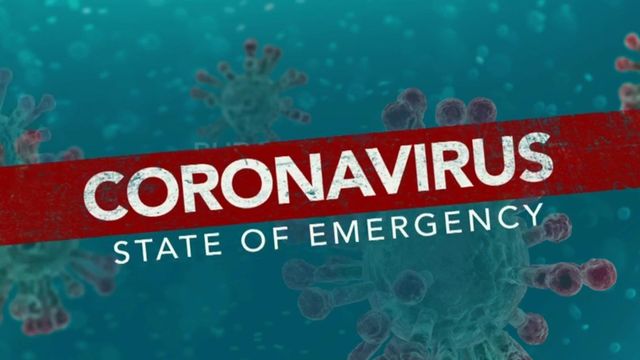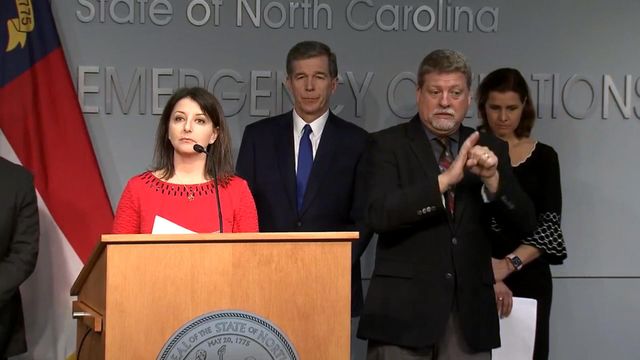Governor declares state of emergency over coronavirus in NC
As the number of people infected with coronavirus continues to increase, Gov. Roy Cooper on Tuesday declared a state of emergency in North Carolina to stem the spread of the virus.
Seven North Carolina residents have tested positive for the virus so far, including five who attended a conference in Boston last month that has been linked to dozens of cases in various states.
"While we do expect many more cases, we can limit the number of people who get seriously ill," Cooper said at a news conference. "Protecting public health means being cautious and prepared. Today, we are both."
What does a state of emergency mean for the state? Cooper said his declaration provides more flexibility in spending and personnel to respond faster to the crisis and makes price gouging on supplies to combat the virus illegal.
"How long do we think we'll be in this activated posture? I don't think anyone could know the answer," said Dr. Mandy Cohen, secretary of the state Department of Health and Human Services. "We're planning for this to be an extended posture. ... It could be months."
As part of the state of emergency, state officials are asking people 65 and older and those with health problems – both groups are considered at highest risk from the virus – to avoid large gatherings, Cohen said. Also, nursing homes, assisted living centers and other residential facilities that cater to the high-risk groups are asked to restrict visitors and step up cleaning, she said.
UNC Health quickly implemented voluntary restrictions on visitors to its hospitals. In addition to its flu season restriction for children under 12, officials are urging friends and relatives of patients to stay home and "use virtual options to communicate." The restrictions may be tightened in the future if the coronavirus situation gets worse, officials said.
State officials want groups sponsoring large events to encourage people in the high-risk groups not to attend, to provide "lenient" refund policies and to provide more space for those who do attend so they're not in close contact with others, Cohen said. Those organizations are likewise asked to clean more frequently and more thoroughly.
The new guidelines come as the ACC Tournament gets underway in Greensboro – the city also will host first- and second-round games in the NCAA Tournament late next week. Cooper said he personally would continue going to games but noted he's not in a high-risk group.
"People have to make their own decisions," he said. "We're making no recommendations about canceling anything. We're just talking to the public at large, the steps that we want to take at a mass gathering."
Work from home recommended
Employers in the Triangle, which is home to all seven coronavirus cases in the state, are asked to have people work from home as much as possible, stagger employee schedules so large groups aren't arriving and leaving at the same time and be as flexible as possible regarding sick leave, Cohen said.
Cooper also issued an executive order reiterating the workplace recommendations for workers in state agencies under his control.
"This is a critical moment in the growing outbreak of COVID-19 in North Carolina," she said, referring to the illness associated with the new coronavirus. "Such measures can potentially impact the spread of the disease."
Forty-four people statewide have been tested so far for coronavirus, and another 25 tests were being processed in a state lab on Tuesday, said State Health Director Dr. Elizabeth Tilson. That figure doesn't include tests performed at local health departments that are being processed by Burlington-based LabCorp, which is handling some tests in a number of states, she said.
The state lab now has enough supplies to test about 300 people, double the number from late last week, Cooper said. The Centers for Disease Control and Prevention has been struggling to keep up with the soaring demand for coronavirus test kits.
"We hope by next week we'll be able to have sufficient supplies to test an additional, maybe, 1,500 people," Tilson said.
No school cancellations called for
State officials aren't calling for any schools to cancel classes right now, unless there are specific instances of infected students. But Cohen said that could change in the future.
The Wake County Public School System also has canceled all school field trips and employee travel to minimize the potential spread of the virus. District officials said they are "evaluating all future school events that attract crowds" and will announce decisions on whether they will proceed, be postponed or canceled in the coming days.
Cumberland County Schools also canceled all field trips and staff travel outside of the county, although travel to sports competitions in North Carolina can continue. Other in-state competitions will be handled on a case-by-case basis, officials said.
Duke University extended spring break and asked that students not return to campus after the break, on March 23. The school is suspending all in-person classes until further notice and will shift all classes online, officials said. Duke also is suspending all non-essential travel by employees and is canceling all events on campus – reunions, concerts, conferences and campus tours – through April 20.
The University of North Carolina at Chapel Hill last week told students and staff that anyone traveling to a foreign country with a major coronavirus outbreak or to any place in the U.S. where a state of emergency has been declared because of the virus would need to quarantine themselves for two weeks upon return.
Now that North Carolina itself is on that list, Cohen said, students should simply monitor their own health and report symptoms of fever, coughing and shortness of breath of campus or local health officials.
"We do want people to take this seriously, but we also want them to go on living their lives," Cooper said. "We want to make sure that our reaction and our prevention matches the problem that we have."











